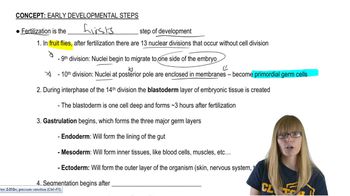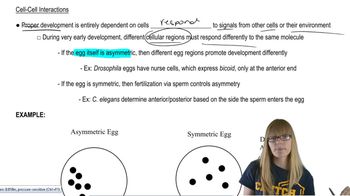Table of contents
- 1. Introduction to Genetics51m
- 2. Mendel's Laws of Inheritance3h 37m
- 3. Extensions to Mendelian Inheritance2h 41m
- 4. Genetic Mapping and Linkage2h 28m
- 5. Genetics of Bacteria and Viruses1h 21m
- 6. Chromosomal Variation1h 48m
- 7. DNA and Chromosome Structure56m
- 8. DNA Replication1h 10m
- 9. Mitosis and Meiosis1h 34m
- 10. Transcription1h 0m
- 11. Translation58m
- 12. Gene Regulation in Prokaryotes1h 19m
- 13. Gene Regulation in Eukaryotes44m
- 14. Genetic Control of Development44m
- 15. Genomes and Genomics1h 50m
- 16. Transposable Elements47m
- 17. Mutation, Repair, and Recombination1h 6m
- 18. Molecular Genetic Tools19m
- 19. Cancer Genetics29m
- 20. Quantitative Genetics1h 26m
- 21. Population Genetics50m
- 22. Evolutionary Genetics29m
14. Genetic Control of Development
Early Developmental Steps
Problem 1c
Textbook Question
Textbook QuestionIn this chapter, we have focused on large-scale as well as the inter- and intracellular events that take place during embryogenesis and the formation of adult structures. In particular, we discussed how the adult body plan is laid down by a cascade of gene expression, and the role of cell–cell communication in development. Based on your knowledge of these topics, answer several fundamental questions:
How do we know that molecular gradients in the egg of Drosophila exist?
 Verified Solution
Verified SolutionThis video solution was recommended by our tutors as helpful for the problem above
Video duration:
2mPlay a video:
175
views
Was this helpful?
Related Videos
Related Practice
Showing 1 of 2 videos


